#SpaceAppsPH
Explore tagged Tumblr posts
Text
Filipino startup recognized in addressing SDG's using space tech

MANILA, Philippines -- A Filipino startup is recognized globally in developing a dengue hotspot prediction system using satellite and climate data in the 2020 Group on Earth Observations Sustainable Development Goals (GEO SDG) Awards for the Sectoral category, For-Profit. The GEO SDG Awards recognize the productivity, ingenuity, proficiency, novelty, and exemplary communications of results and experiences in the use of Earth observations to support sustainable development.
CirroLytix Research Services was formed to create social impact through big data. Through the application of machine learning, data engineering, remote sensing, and social listening, the Philippines-based data analytics firm hopes to help governments, researchers, non-government organizations (NGO), and social enterprises achieve positive change. The Advanced Early Dengue Prediction and Exploration Service (Project AEDES) is one of the CirroLytix’s flagship projects developed during the 2019 National Aeronautics and Space Administration's (NASA) International Space Apps Challenge. It combines digital, climate, and remote sensing to nowcast dengue trends and detect mosquito habitats to help pre-empt cases of dengue. Project AEDES process leverages normalized difference vegetation index (NDVI), Fraction of absorbed photosynthetically active radiation (FAPAR), and normalized difference water index (NDWI) readings from Landsat and Sentinel-2 to estimate still water areas on the ground, which is correlated with dengue case counts from national health centers.
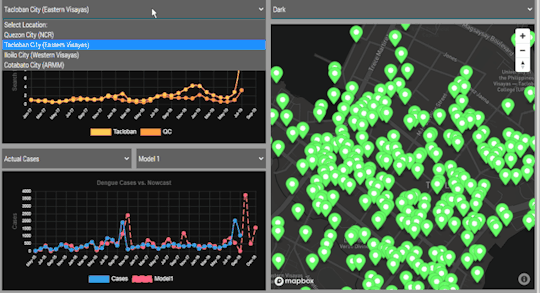
Dominic Vincent "Doc" Ligot, co-founder and chief technology officer of CirroLytix, describes Project AEDES as an "early detection of panics from online searches, anticipating case counts from environment readings, but most importantly pinpointing hotspots from mosquito habitat detection."
The Pinoy-made dengue mapper tool won the annual international hackathon of NASA globally in the best use of data, the solution that best makes space data accessible, or leverages it to a unique application. Aside from winning last year, CirroLytix also developed an integrated public policy information portal measuring the impact of the coronavirus pandemic using Earth observation, in-country economic and human mobility data, and global infection case counts, thus winning again in the Space Apps COVID-19 Challenge for the same category in the best use of data. Named G.I.D.E.O.N. (Global Impact Detection from Emitted Light, Onset of COVID-19, and Nitrogen Dioxide), this dashboard for policy makers and economic planners shows the impact of COVID-19 on various countries and effects on the economy and environment.
With these achievements, Cirrolytix is recognized in their remarkable efforts to utilize Earth observation data to predict dengue fever cases in the Philippines in order to improve public health.
"I am glad that the GEO SDG Awards Panel has selected CirroLytix for an award, recognizing the importance of this work in developing an EO-integrated dengue case predictor mapping system," according to Dr. Argyro Kavvada, lead for Sustainable Development Goals of the Earth Science Division, NASA's Science Mission Directorate and executive secretary of the international Earth Observations for the Sustainable Development Goals (EO4SDG).
"These awards really could stand as an inspiration to all of us about what can be done, and what needs to be done to ensure that Earth-observations contribute to make our world a better, and more sustainable place," said Lawrence Friedl director of the Applied Sciences Program of the Earth Science Division, NASA's Science Mission Directorate and co-chair of EO4SDG.
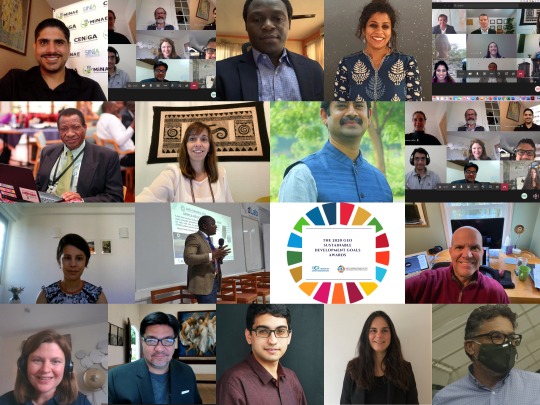
The Undersecretary for Competitiveness and Innovation of the Department of Trade and Industry (DTI) Dr. Rafaelita "Fita" M. Aldaba heartfeltly congratulates CirroLytix. "It's indeed a blessing amid this pandemic and economic crisis that we are currently faced with," she said.
The award-winning startup continues to update the AEDES framework to include socio-economic risk mapping to turn it into a health and environmental policy tool. Aside from dengue, the company also supports COVID-19 modeling and response initiatives with the public health sector. CirroLytix’s current involvements include public health, human rights, fighting disinformation, education and food security.
The Space Apps lead organizer in the Philippines Michael Lance M. Domagas appeals support for these Filipino winners. "How many times should these Filipino innovators and achievers need to win before being recognized and appreciated by our own country? To be recognized by not just one, but five space agencies is something has not yet been achieved by Filipinos, how much more of a multitude of countries and nations supporting the sustainable development goals of the United Nations?" He added that "The dengue epidemic and the COVID-19 is a real threat to the Philippine society right now, endangering health, well-being, livelihood, and most especially businesses and the national economy. If we could only learn how to give value to science, technology, mathematics, and engineering (STEM), the possibilities are endless. Our Filipino winners of Space Apps and GEO SDG Awards have taught us on how these space technologies greatly help in addressing epidemics and economic impact of COVID-19, its time to give them recognition and respect because they are Filipinos like us." Winners shall be invited to visit NASA once travel is deemed safe, but unfortunately, travel, meals and incidental expenses, and accommodation expenses are not provided.
On the other hand, Cirrolytix encourages the use of data in addressing social problems and issues surrounding the Bangsamoro region. Together with the Asia Foundation and Data Ethics PH, the online Bangsamoro Data Challenge invites ages 15 years old and above to develop data-driven solutions in helping the region. Deadline for registration is on Saturday 11:59pm, November 21, 2020 at https://barmm.opendata.org.ph/
The Group on Earth Observations (GEO) is a partnership of more than 100 national governments and in excess of 100 participating organizations that envisions a future where decisions and actions for the benefit of humankind are informed by coordinated, comprehensive and sustained Earth observations.
0 notes
Text
Filipinos developed solutions at home together with NASA
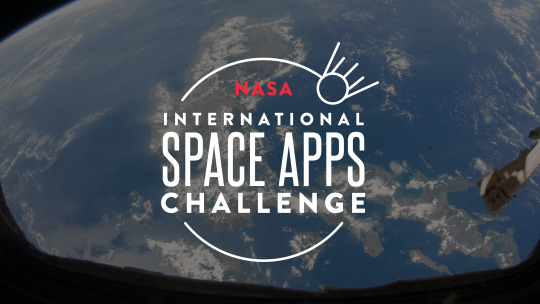
MANILA, Philippines -- Last October 2-4, 2020, Filipino developers, engineers, technologists, designers, scientists, coders, storytellers, makers, builders, innovators, and entrepreneurs from Luzon, Visayas, and Mindanao came together to address real-world problems on Earth and space by engaging with the United States space agency National Aeronautics and Space Administration's (NASA) free and open data, together with partner agencies like Japan Aerospace Exploration Agency (JAXA), National Centre for Space Studies (CNES) of France, the Canadian Space Agency (CSA), and the European Space Agency (ESA) in a virtual hackathon. Some of the projects developed include road hazard detection, data visualization tools, and machine learning for satellite image monitoring, and a lot more.
This year's edition of NASA's International Space Apps Challenge was held online due to the coronavirus pandemic situation worldwide. The theme of this year "Take Action" -- is a critical reminder that anyone can make a difference, even from the comfort and safety of home. In this unprecedented time, the Space Apps community exists as a reminder that there the tools and talents to tackle challenges facing the planet, as well as the ability to unite across boundaries and borders of all kinds.
Vice President Leni Robredo lauded this event as "our ability to gather ourselves, organize, and come together have opened the doors to technology and progress. We have done great things, cure diseases, find ways to connect with each another across the oceans, and even walked on the Moon... all thanks to mutual cooperation."
The first Director-General of the Philippine Space Agency (PhilSA) Dr. Joel Joseph S. Marciano Jr. stressed the importance of space science in helping the society. "Space infrastructure, space data, and space-enabled services therefore help inform policies and decision-support systems that can lead us to better plan and decongest our cities, improve our transportation systems, monitor the state of infrastructure, enable better connectivity, enhance our agricultural and fisheries production, and protect our natural environment," he said.
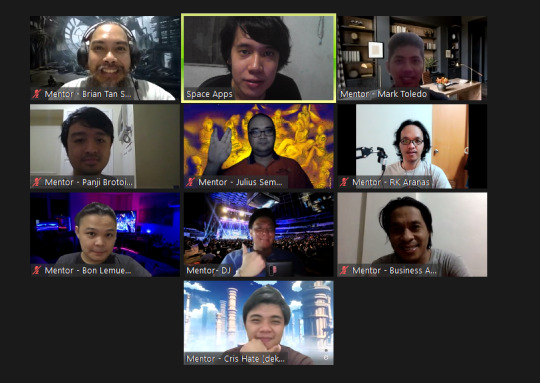
Since the start of Space Apps in the Philippines on 2016, the country witnessed on how the community grew from a group of volunteers to forging partnerships with collaborators and stakeholders. For many years, Filipinos collaborate and work with one another in developing projects to solve problems using space technologies. NASA and partner agencies recognized the hard work done by Filipinos, and thus being recognized and awarded globally as winners and finalists consecutively in the past three years. Software developer Michael Lance M. Domagas is optimistic that in these momentous and trying times, the country would still choose to prioritize and give value to science, technology, engineering, and mathematics (STEM), especially in emerging fields like space science where innovators can contribute and solve the most pressing problems prevailing in the society and environment today.
"How could someone imagine that Earth-observation data coming from space could give us valuable and unique insights about the socio-economic impact of the coronavirus pandemic in various countries, and to pinpoint possible mosquito habitats which causes another epidemic called dengue? Why can't we support our own modern-day heroes specializing in new and emerging technologies to address issues and help others in our country? NASA and partner agencies from other countries have already recognize the ingenuity of Filipinos for the past three years. Now is the proper time for our own country to recognize their achievements too," Michael Lance said. Together with technology and developer community leader Tzar C. Umang from Pangasinan and U.S. cultural affairs officer Matt T. Keener, Michael Lance looks forward in having more Filipino winners and finalists being recognized, and to a more meaningful and impactful Space Apps challenge in the future years to come.
The Department of Trade and Industry (DTI) undersecretary for competitiveness and innovation Dr. Rafaelita "Fita" M. Aldaba, Analytics Association of the Philippines (AAP) president Colin Christie, former Department of Information and Communications Technology (DICT) undersecretary and University of the Philippines System Information Technology Foundation president Monchito B. Ibrahim, assistant professor and assistant chairman for administration, Department of Geodetic Engineering at the University of the Philippines and Sustained Support for Local Space Technology and Applications Mastery, Innovation and Advancement (STAMINA4Space) GRASPED project staff Dr. Czar Jakiri S. Sarmiento, part-time lecturer and technopreneurship/program manager at the Technological Institute of the Philippines (TIP) Nitro Erwin A. Lizarondo, senior consultant for data analytics for social impact at CirroLytix, Data Ethics PH, and COVID-19 challenge winner for the best use of data Nick Tobia, and Africa University chair educational technologies and United Nations Office for Outer Space Affairs (UNOOSA) Space4Women mentor Ms. Basuti Gerty Bolo from Zimbabwe served as local judges in Manila.
Community partners include STAMINA4Space, PhilSA, the Philippine Council for Industry, Energy and Emerging Technology Research and Development of the Department of Science and Technology (DOST-PCIEERD), DTI-Design Center of the Philippines, AAP, Data Ethics PH, CirroLytix, PWA Pilipinas, TMDC IT Solutions, Pampanga Developers Group, Koodi, Web and Mobile Developers PH, UXPH, DevCon, Alaga Health, Philippine Information Technology Organization (Phil IT Org), TIP Nitro, De La Salle University, Google Developers Group (GDG) Cloud Manila, 98 labs, United Pangasinan ICT Council, Code UX, DesignMNL Studio, Talino Labs, Impact Hub Manila, Elinnov Technologies, Drupal Pilipinas, Pantheon, Wadwhani Foundation, Youth for Women in Technology (WiTech), Kallisto, Wavefarers, Stock Knowledge, MVN Photostudio, and the U.S. embassy.
"The Global Organizing Team is inspired by the journey the Philippines has with the Space Apps program. In particular, we appreciate the development of STEM in the Philippines and elsewhere, because one goal of Space Apps is to foster interest and learning in these fields worldwide," said Matt Scott, the global community director and storyteller.
The recent COVID-19 challenge winners and finalists discussed how their space-based solutions address the coronavirus pandemic during the Data Brew 4: Space and Ground Data for the Betterment of the Human Condition on Wednesday, October 7, 2020 by the Remote Sensing and Data Science (DATOS) Help Desk of the DOST-Advanced Science and Technology Institute with PhilSA and STAMINA4Space.
In the Philippines, Space Apps is part of the World Space Week and celebrates the Design Week Philippines with DTI-Design Center of the Philippines.
Space Apps is a NASA-led initiative organized in collaboration with Booz Allen Hamilton, Mindgrub, SecondMuse, and the NASA Open Innovation Applied Sciences Program.
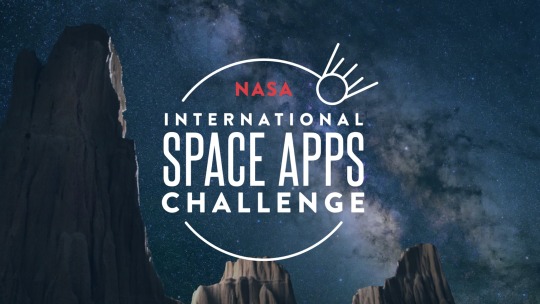
0 notes
Text
"Take Action" from home with NASA

MANILA, Philippines -- On October 2-4, The United States space agency National Aeronautics and Space Administration (NASA) invites coders, entrepreneurs, scientists, designers, storytellers, makers, builders, artists, and technologists to come together in a global, virtual hackathon. During a period of 48 hours, participants from around the world will come together to create virtual teams and solve challenges using NASA’s open-source data.
Designed for those interested in space science and exploration, this hackathon allows the next generation of scientists, technologists, designers and engineers to showcase their creativity and problem-solving skills through inspired collaboration and critical thinking.
As part of Space Apps, everyone belongs to a global hackathon community which embraces collaboration across borders, sectors, and cultures to bring about paradigm-shifting innovation.
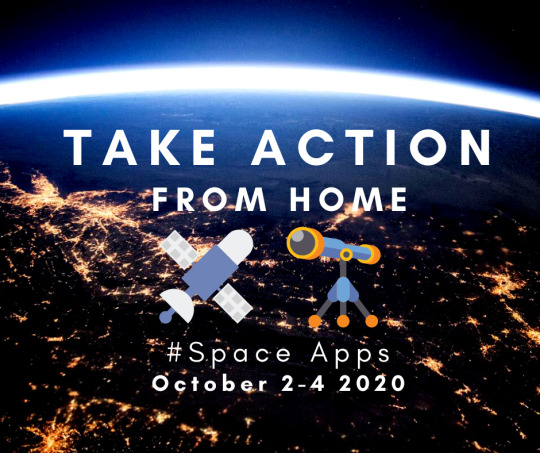
In light of the COVID-19 pandemic and in the interest of the global community’s health and safety, this year’s hackathon will be an all-virtual event. In other words, all events shall be moved online. In this unprecedented time, the Space Apps community exists as a reminder that everyone has the tools and talents to tackle the challenges facing the planet, as well as the ability to unite across boundaries and borders of all kinds.
The theme for this year -- "Take Action" -- is a critical reminder that anyone can make a difference, even from the comfort and safety of home.
youtube
Japan Aerospace Exploration Agency (JAXA), National Centre for Space Studies (CNES) of France, and the Canadian Space Agency (CSA) will be partnering again with NASA for this hackathon.
Since Space Apps is brought to the Philippines by developer and technology community leader Tzar C. Umang from Pangasinan last 2016, the country witnessed on how the community grew from a group of volunteers to forging partnerships with collaborators and stakeholders. The Philippines produced global winners like the dengue hotspot predictor Project AEDES and information portal G.I.D.E.O.N. measuring COVID-19 impact, both developed by CirroLytix. The country also has global finalists like Celestial Snails from De La Salle University addressing social isolation and Sentinellium, an epidemic predictor using population density data, both addressing problems caused by the coronavirus pandemic.
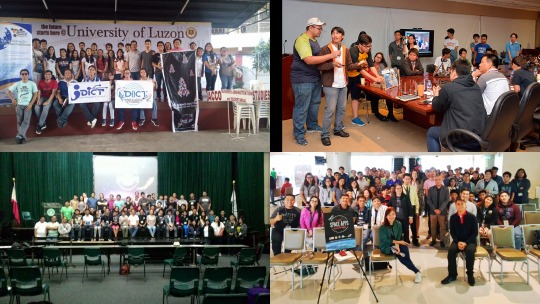
While recognition and honor was given to the Philippines by NASA and partner agencies, lead organizer Michael Lance M. Domagas hopes that the country would soon realize the importance and value of giving support and assistance in the development of these winning projects, so that fellow Filipinos would benefit from these technologies coming from outer space in times of emergencies like COVID-19 and dengue epidemic. "Space Apps is a perfect venue which can arouse curiosity and interest of Filipinos to science, technology, engineering, and mathematics (STEM), including space and Earth sciences. Our own country's support should have been a way to inspire more Filipinos and further develop winning projects," he said. Space Apps can be a program in developing "space education and promote public awareness" stated in Section 8 of Republic Act 11363 otherwise known as the "Philippine Space Act."
"The Global Organizing Team is inspired by the journey the Philippines has with the Space Apps program. In particular, we appreciate the development of STEM in the Philippines and elsewhere, because one goal of Space Apps is to foster interest and learning in these fields worldwide," according to Matt Scott, the Global Community Director and Storyteller.
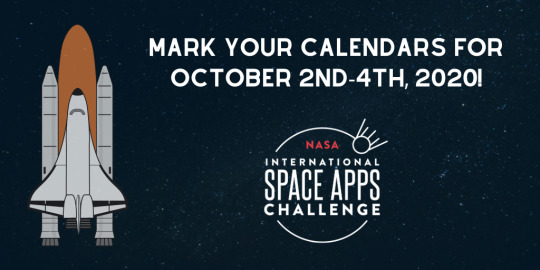
Register now on these sites:
Central Luzon: https://2020.spaceappschallenge.org/locations/pampanga
Northern Luzon: https://2020.spaceappschallenge.org/locations/mapandan-pangasinan
Manila and the rest of the Philippines: https://2020.spaceappschallenge.org/locations/manila
Space Apps is a NASA-led initiative organized in collaboration with Booz Allen Hamilton, Mindgrub, SecondMuse, and the NASA Open Innovation Applied Sciences Program.
0 notes
Text
Pinoy app addressing pandemic impact wins the Space Apps COVID-19 Challenge
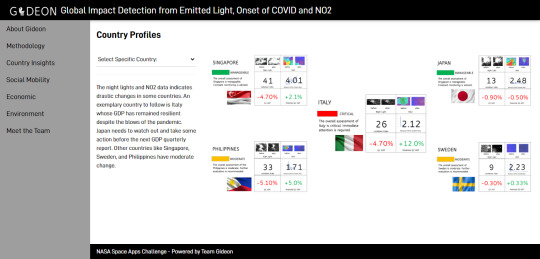
MANILA, Philippines - An integrated public policy information portal measuring the impact of the coronavirus pandemic developed by Filipinos won the Space Apps COVID-19 Challenge in the best use of data, the solution that best makes space data accessible, or leverages it to a unique application. Using Earth observation, in-country economic and human mobility data, and global infection case counts, data analysts Nick Tobia, Helen Mary Barrameda, Kristel Joyce Zapata, Theresa Rosario Tan, and Miguel Oscar Castelo from CirroLytix created a dashboard for policy makers and economic planners to show the impact of COVID-19 on various countries and effects on the economy and environment.
Named G.I.D.E.O.N. (Global Impact Detection from Emitted Light, Onset of Covid-19, and Nitrogen Dioxide), the portal uses news feeds, Google mobility data, and coronavirus cases revealing the multi-dimensional impact of lockdown and other interventions. Night lights from the Visible Infrared Imaging Radiometer Suite (VIIRS) and nitrogen dioxide levels from Sentinel-5P show current impacts and forecast effects of lockdown. Google's community mobility reports, global infection data from Johns Hopkins University, and nitrogen dioxide data reveal pollution levels produced by human activity, and monitor which countries keep air quality under control as they bounce back from lockdown and pave the way for the "new normal."
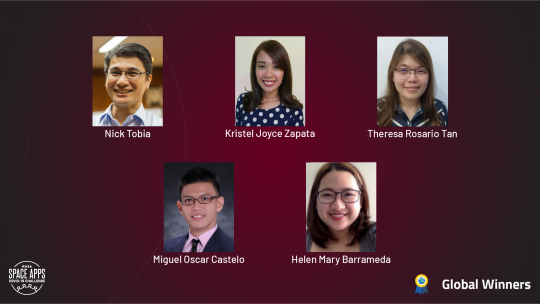
Aside from having a global winner, two Pinoy teams made it as global finalists too.
Inspired by social isolation experienced by astronauts in space, Snail Space (A wordplay for snail's pace) is an app giving a "safe space" by providing mental care and comfort during times of social isolation brought by COVID-19 pandemic. It was developed by Celestial Snails team comprised of Arturo Caronongan III, Kevin Olanday, In Yong Lee, Mary Anne Dominique Casacop, and Gabriel Santiago from De La Salle University.
With public health in mind, Sentinellium leverages user data sent through SMS and chat, and space assets like population density, urbanization, and aerosol to provide a more accurate prediction of developing epidemics. This was done by Harlee Quizzagan, James Andrew C. Cornes, Angela Chua, Alaica Mariño, Joal Rose Lin, and Mohammad Ashraful Mobin, in which their group was formed during the hackathon period.
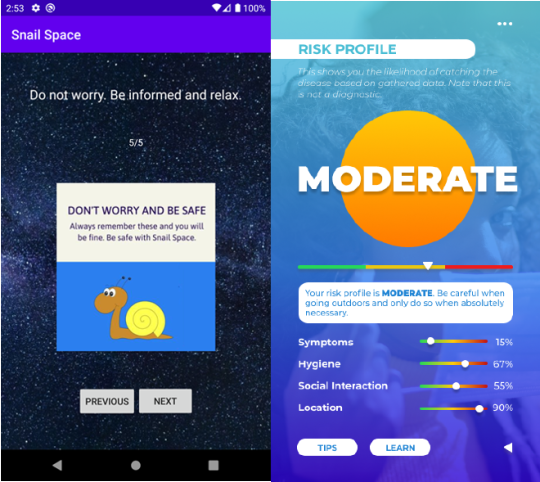
"The use of these modern and advanced technologies will be crucial, especially as the world navigates the fourth industrial revolution. Using big data, cloud, and AI applications for instance, could help us understand the severity of the disease and aid in delivering measures to mitigate its impact," according to the Undersecretary for Competitiveness and Innovation of the Department of Trade and Industry (DTI) Dr. Rafaelita "Fita" M. Aldaba. "This really fills me with great optimism that our young and talented startups and Filipinos have so much to offer and contribute to our efforts to provide solutions to address health and economic crisis," she said.
Last May 30-31, 2020, coders, entrepreneurs, scientists, designers, storytellers, makers, builders, artists, and technologists have been invited in an all-virtual, global hackathon by the United States space agency National Aeronautics Space Administration (NASA), along with the European Space Agency (ESA), Japan Aerospace Exploration Agency (JAXA), the National Centre for Space Studies (CNES) of France, and Canadian Space Agency (CSA). During a period of 48 hours, more than 15,000 participants from 150 countries created more than 2,000 virtual teams. Participants used Earth observation and other open data to propose solutions to one of twelve challenges related to the COVID-19 pandemic.
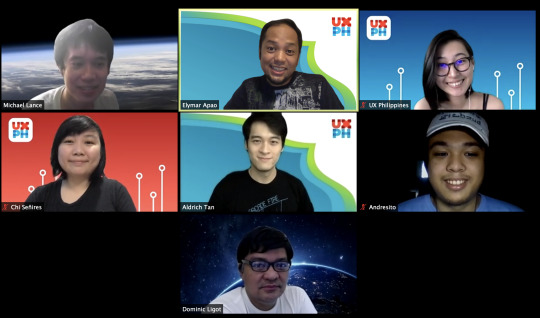
During the virtual bootcamp one week prior to the hackathon, Ellison Castro, Cara Patricia Canlas, and Arlo Jayson Sabuito from STAMINA4Space discussed the capabilities of microsatellites in determining the height of clouds and forest fire mapping using support vector machine. During the hackathon, Aldrich Tan, Elymar Apao, Chi Señires, and Janyl Tamayo from UXPH helped participants in designing and bringing user experience to their projects. Andresito de Guzman of PWA Pilipinas taught participants on developing progressive web applications. 2019 global winner in the best use of data Dominic Vincent Ligot from the Analytics Association of the Philippines and Data Ethics PH brought inspiration by emphasizing the importance of data analytics for social good.
G.I.D.E.O.N. is one of the six global winners selected by NASA, ESA, JAXA, CSA, and CNES, and one of the three teams shall have special access to the Euro Data Cube environment. If travel is deemed safe, winners shall also be invited to visit a NASA site to view a spacecraft launch. However, travel, accommodation, and food costs are not included. Lead organizer Michael Lance M. Domagas appeals support for the current and past winners, finalists, and especially to the four-year community who worked so hard in bringing honor for the country. "After being recognized by five leading space agencies of the planet, its time for our own country to show appreciation and give support for those who are stepping forward in combating the COVID-19 pandemic and its effects in our society today to defeat our common enemy," he said.
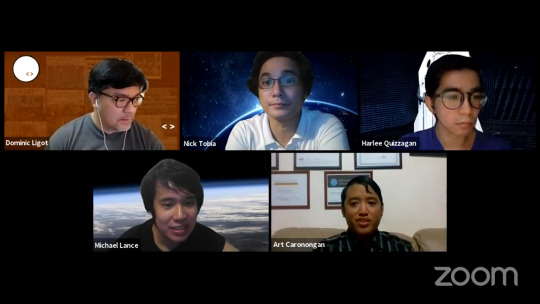
Previous Pinoy hackathon winners are Project AEDES (2019), using satellite and climate data to pinpoint possible dengue hotspots, and ISDApp (2018), which uses citizen science data to inform fishermen the right time to catch fish.
The Space Apps COVID-19 Challenge is a special edition of NASA’s annual Space Apps Challenge, an international hackathon that takes place around the world and online every October. Since 2012, teams have engaged with NASA's free and open data to address real-world problems on Earth and in space. Space Apps 2019 included more than 29,000 participants in 71 countries, developing more than 2,000 hackathon solutions over one weekend. This NASA-led initiative is organized in collaboration with Booz Allen Hamilton, Mindgrub, and SecondMuse. The next annual Space Apps Challenge is scheduled for October 2-4, 2020 in a virtual format. Registration opens August 15: https://2020.spaceappschallenge.org/locations/manila
1 note
·
View note
Text
Pinoy dengue case predictor mapping system wins the 2019 NASA global hackathon
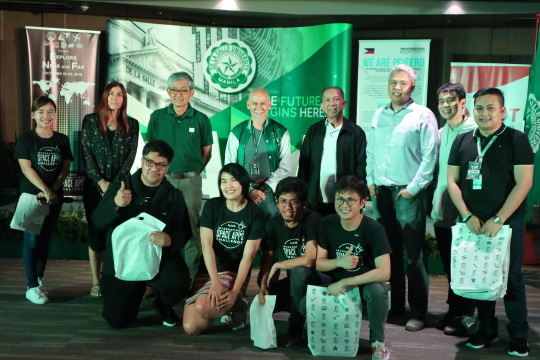
MANILA, Philippines -- A dengue case forecasting system using space data made by Pinoy developers won the 2019 National Aeronautics and Space Administration's International Space Apps Challenge. Over 29,000 participating globally in 71 countries, this Pinoy solution made it as one of the six winners in the best use of data, the solution that best makes space data accessible, or leverages it to a unique application.
Dengue fever is a viral, infectious tropical disease spread primarily by Aedes aegypti female mosquitoes. With 271,480 cases resulting in 1,107 deaths reported from January 1 to August 31, 2019 by the World Health Organization, Dominic Vincent D. Ligot, Mark Toledo, Frances Claire Tayco, and Jansen Dumaliang Lopez from CirroLytix developed a forecasting model of dengue cases using climate and digital data, and pinpointing possible hotspots from satellite data.
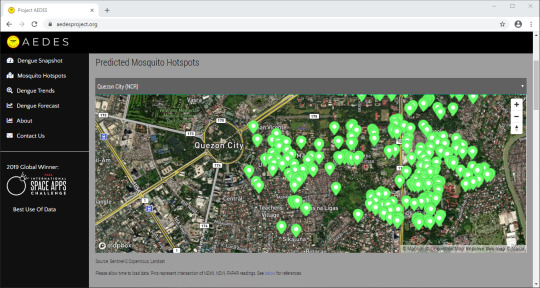
Correlating information from Sentinel-2 Copernicus and Landsat 8 satellites, climate data from the Philippine Atmospheric, Geophysical and Astronomical Services Administration of the Department of Science and Technology (DOST-PAGASA) and trends from Google search engines, potential dengue hotspots will be shown in a web interface.
youtube
Check out the website here: http://aedesproject.org/

"AEDES aims to improve public health response against dengue fever in the Philippines by pinpointing possible hotspots using Earth observations," Dr. Argyro Kavvada of NASA Earth Science and Booz Allen Hamilton explained. The DOST-Philippine Council for Industry, Energy and Emerging Technology Research and Development (DOST-PCIEERD) deputy executive director Engr. Raul C. Sabularse said that the winning solution "benefits the community especially those countries suffering from malaria and dengue, just like the Philippines. I think it has a global impact. This is the new science to know the potential areas where dengue might occur. It is a good app."
"It is very relevant to the Philippines and other countries which usually having problems with dengue. The team was able to show that it's not really difficult to have all the data you need and integrate all of them and make them accessible to everyone for them to be able to use it. It's a working model," according to Monchito B. Ibrahim, industry development committee chairman of the Analytics Association of the Philippines and former undersecretary of the Department of Information and Communications Technology.
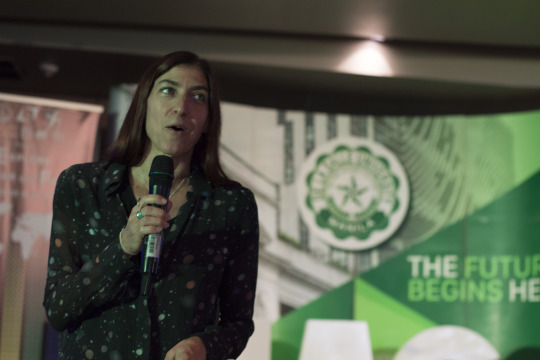
The leader of the Space Apps global organizing team Dr. Paula S. Bontempi, acting deputy director of the Earth Science Mission, NASA's Science Mission Directorate remembers the pitch of the winning team when she led the hackathon in Manila. "They were terrific. Well deserved!" she said.
"I am very happy we landed in the winning circle. This would be a big help particularly in addressing our health-related problems. One of the Sustainable Development Goals (SDGs) is on Good Health and Well Being and the problem they are trying to address is analysis related to dengue," said Science and Technology secretary Fortunato T. de la Peña. Rex Lor from the United Nations Development Programme (UNDP) in the Philippines explained that the winning solution showcases the "pivotal role of cutting-edge digital technologies in the creation of strategies for sustainable development in the face of evolving development issues."
U.S Public Affairs counselor Philip W. Roskamp and PLDT Enterprise Core Business Solutions vice president and head Joseph Ian G. Gendrano congratulates the next group of Pinoy winners.
Sec. de la Peña is also very happy on this second time victory for the Philippines on the global competition of NASA. The first winning solution ISDApp uses "data analysis, particularly NASA data, to be able to help our fishermen make decisions on when is the best time to catch fish." It is currently being incubated by Animo Labs, the technology business incubator and Fab Lab of De La Salle University in partnership with DOST-PCIEERD. Project AEDES will be incubated by Animo Labs too.
University president Br. Raymundo B. Suplido FSC hopes that NASA Space Apps would "encourage our young Filipino researchers and scientists to create ideas and startups based on space science and technology, and pave the way for the promotion and awareness of the programs of our own Philippine space agency."
Vice President Leni Robredo recognized Space Apps as a platform "where some of our country's brightest minds can collaborate in finding and creating solutions to our most pressing problems, not just in space, but more importantly here on Earth."
youtube
"Space Apps is a community of scientists and engineers, artists and hackers coming together to address key issues here on Earth. At the heart of Space Apps are data that come to us from spacecraft flying around Earth and are looking at our world," explained by Dr. Thomas Zurbuchen, NASA associate administrator for science.
"Personally, I'm more interested in supporting the startups that are coming out of the Space Apps Challenge," according to DOST-PCIEERD executive director Dr. Enrico C. Paringit.
In the Philippines, Space Apps is a NASA-led initiative organized in collaboration with De La Salle University, Animo Labs, DOST-PCIEERD, PLDT InnoLab, American Corner Manila, U.S. Embassy, software developer Michael Lance M. Domagas, and celebrates the Design Week Philippines with the Design Center of the Philippines of the Department of Trade and Industry. It is globally organized by Booz Allen Hamilton, Mindgrub, and SecondMuse.
Space Apps is a NASA incubator innovation program. The next hackathon will be on October 2-4, 2020.
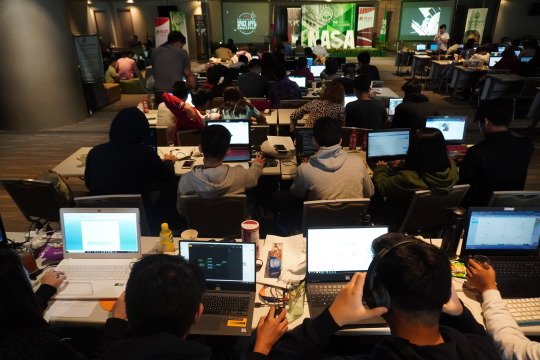
0 notes
Text
Pinoy-made ocean waste collector and dengue mapper to join the NASA global hackathon
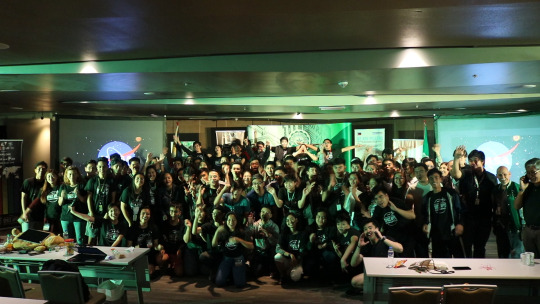
MANILA, Philippines - A deployable, autonomous ocean waste collection system utilizing space data to locate nearby garbage patches built by students from De La Salle University and an automated information portal which correlates dengue cases with real-time data from satellite, climate, and search engines won the National Aeronautics and Space Administration's International Space Apps Challenge last October 18-20, 2019 in Manila, in collaboration with the Philippine Council for Industry, Energy and Emerging Technology Research and Development of the Department of Science and Technology (DOST-PCIEERD), Animo Labs technology business incubator, PLDT InnoLab, American Corner Manila, the U.S. government, and part of the Design Week Philippines with Department of Trade and Industry-Design Center of the Philippines.
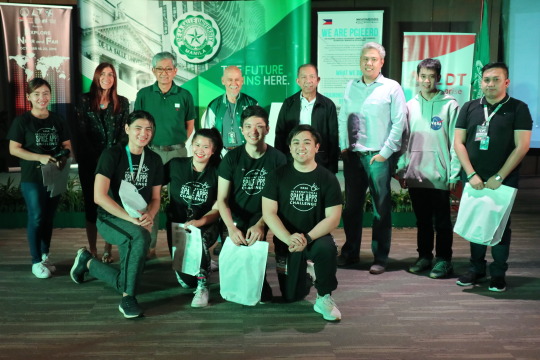
Using NASA's Ocean Surface Current Analysis Real-time (OSCAR) data to determine possible locations of ocean garbage patches using GPS, PaWiKAN uses a pair of deployable, dynamically reconfigurable boats capable of trapping and returning ocean waste back to ground. It is equipped with extended-range radio system based on LoRa technology and Arduino to communicate with sensors and controlled by a deployment station. It was developed by Lasallian electronics and communications engineering students Samantha Maxine Santos, Antonio Miguel S. Alejo, Grant Lewis Bulaong, and Janos Lance L. Tiberio of Ocean's 4, who also joined the last year's hackathon, creating a hyper-casual puzzle game utilizing images from the Hubble Space Telescope and intuitive physics concepts.
youtube
"Our global bodies of water are actually littered with plastics. This is a very futuristic solution to help get rid of plastics currently floating or submerged in global waters. It is timely and relevant solution," according to Monchito B. Ibrahim, Industry Development Committee Chairman of the Analytics Association of the Philippines and former undersecretary of the Department of Information and Communications Technology.
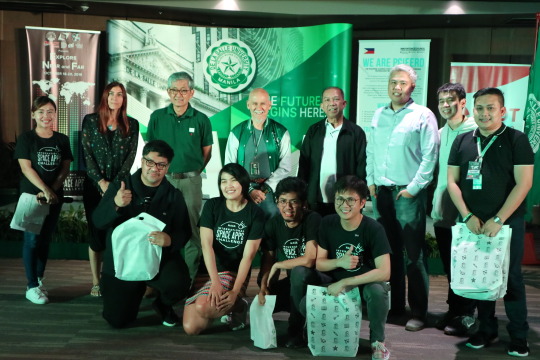
With 271,480 dengue cases resulting in 1,107 deaths as reported from January 1 to August 31, 2019 by the World Health Organization, the Aedes Project team composed of Dominic Vincent D. Ligot, Mark Toledo, Frances Claire Tayco, and Jansen Dumaliang Lopez developed a forecasting model of dengue cases using climate and digital data and pinpointing possible hotspots from satellite data. Correlating information from Sentinel-2 Copernicus and Landsat 8 satellites, DOST-PAGASA for climate, and trends from search engines, potential dengue hotspots will be displayed in a web interface. Indices like Fraction of Absorbed Photosynthetically Active Radiation (FAPAR) and Normalized Difference Vegetation Index (NDVI) are used in identifying areas with green vegetation while Normalized Difference Water Index (NDWI) to identify areas with water. Combining these indices reveal potential areas of stagnant water capable of being breeding grounds of mosquitoes.
youtube
"It benefits the community especially those countries suffering from malaria and dengue, just like the Philippines. I think it has a global impact. This is the new science to know the potential areas where dengue might occur. It is a good app," said Engr. Raul C. Sabularse, deputy executive director of DOST-PCIEERD.
"It is very relevant to the Philippines and other countries which usually having problems with dengue. The team was able to show that it's not really difficult to have all the data you need and integrate all of them and make them accessible to everyone for them to be able to use it. It's a working model. It is something can actually be made usable in a short span of six months," Mr. Ibrahim said.
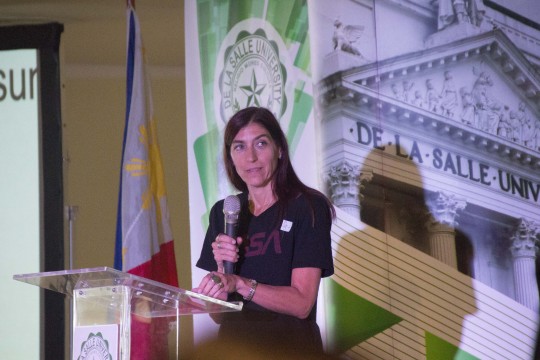
Space Apps leader Dr. Paula S. Bontempi, the acting deputy director of the Earth Science Mission, NASA's Science Mission Directorate was impressed of these solutions presented in Manila, "The top two are really good. There were definitely a few projects right behind them. There is a lot of good talent out there. It was nice to see."
Rex Lor from United Nations Development Programme in the Philippines commended the use of the Sustainable Development Goals on Good Health and Well-Being, and Life Below Water of the winning solutions showcasing the "pivotal role of cutting-edge digital technologies in the creation of strategies for sustainable development in the face of evolving development issues."
Both champions will join teams around the world to be evaluated by NASA to approximately select the top 30 projects as global finalists in early December, and the top six winners will be announced in January 2020. Winners shall be invited to visit the NASA’s Kennedy Space Center at Florida in 2020.
Last year, team iNON used a citizen science platform by NASA to develop an application seeking to communicate scientific data to fishermen even without Internet connection, which led them to victory as the first Pinoy global winner. Their project called ISDApp is currently being incubated by Animo Labs.
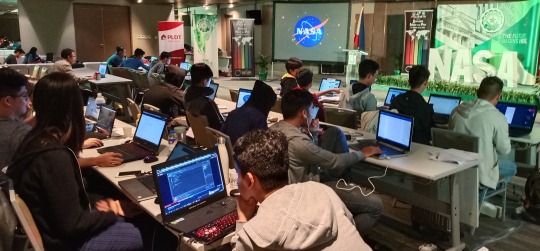
University president Br. Raymundo B. Suplido FSC hopes that NASA Space Apps would "encourage our young Filipino researchers and scientists to create ideas and startups based on space science and technology, and pave the way for the promotion and awareness of the programs of our own Philippine space agency."
Vice President Leni Robredo recognized Space Apps as a platform "where some of our country's brightest minds can collaborate in finding and creating solutions to our most pressing problems, not just in space, but more importantly here on Earth."
"Space Apps is a community of scientists and engineers, artists and hackers coming together to address key issues here on Earth. At the heart of Space Apps are data that come to us from spacecraft flying around Earth and are looking at our world," as explained by Dr. Thomas Zurbuchen, NASA associate administrator for science.
0 notes
Text
Registration for the 2019 NASA International Space Apps Challenge now open
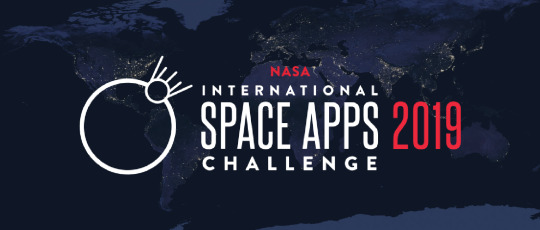
MANILA, Philippines - Now in its 8th year, Space Apps is an international hackathon for coders, scientists, designers, storytellers, makers, builders, technologists, and others in cities around the world, where teams engage with NASA’s free and open data to address real-world problems on Earth and in space. Space Apps 2018 included over 18,000 participants at more than 200 events in 75 countries.
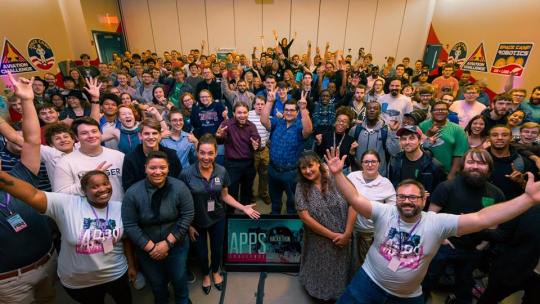
Since its inception in 2012, NASA’s International Space Apps Challenge has become the world’s largest global hackathon, engaging thousands of citizens across the globe to use NASA’s open data to build innovative solutions to challenges we face on Earth and in space.
The NASA International Space Apps Challenge (or Space Apps) is an international hackathon that will take place over a 48-hour period in cities around the globe between October 18 and 20, 2019. The event embraces collaborative problem solving with a goal of producing open-source solutions to challenges we currently face on Earth and in space.
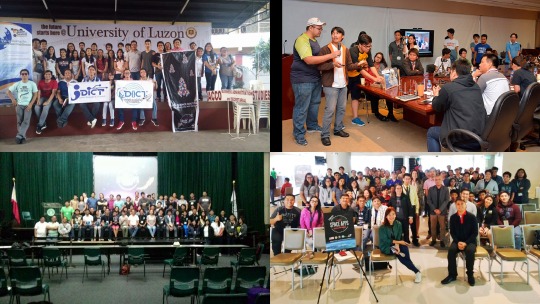
In the Philippines, it is the fourth time for this event to take place again in Manila on October 18 to 20, 2019. "I am thrilled and excited to continue the tradition of inviting students and professionals, beginners and veterans from the Philippines to join this prestigious global hackathon by NASA," software developer Michael Lance M. Domagas said. "In fact, a Pinoy team winning globally last year makes Filipinos inspired to use these technologies in helping the society we live in, especially now that a law has been passed creating the Philippine Space Agency," he added.
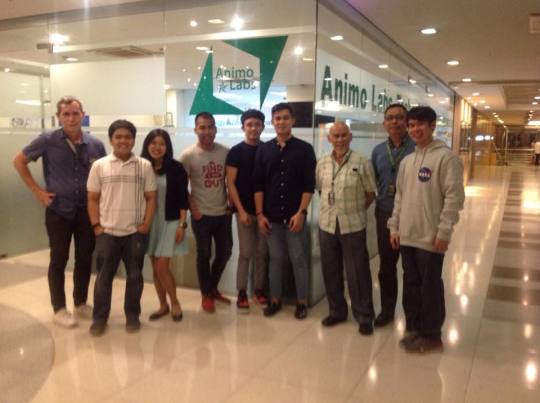
The Pinoy winning team who developed an app seeking to use scientific data to benefit fishermen, even without Internet connection, is being incubated at Animo Labs, the technology business incubator of De La Salle University in partnership with DOST-Philippine Council for Industry, Energy and Emerging Technology Research and Development. "Animo Labs looks forward to see these kinds of projects being developed by Filipinos with the help of NASA data and resources, and we are happy to host it again at De La Salle University," Animo Labs Executive Director Mr. Federico C. Gonzalez said.
Register here: https://spaceapps.splashthat.com/
Deadline of registration is on Monday, October 7, 2019 11:59 PM
For more information, please contact [email protected]
0 notes
Text
NASA, partners launch virtual hackathon to develop COVID-19 solutions
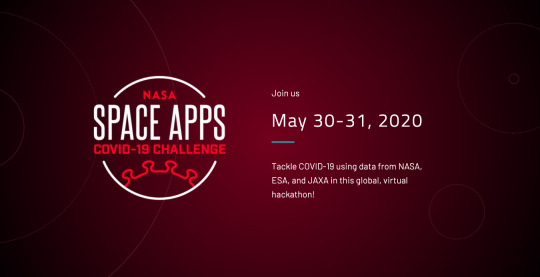
The U.S. space agency National Aeronautics Space Administration (NASA), European Space Agency (ESA), and Japan Aerospace Exploration Agency (JAXA) are inviting coders, entrepreneurs, scientists, designers, storytellers, makers, builders, artists, and technologists to participate in a virtual hackathon May 30-31 dedicated to putting open data to work in developing solutions to issues related to the COVID-19 pandemic.
During the global Space Apps COVID-19 Challenge, participants from around the world will create virtual teams that – during a 48-hour period – will use Earth observation data to propose solutions to COVID-19-related challenges ranging from studying the coronavirus that causes COVID-19 and its spread to the impact the disease is having on the Earth system. Registration for this challenge opens in mid-May.
"There’s a tremendous need for our collective ingenuity right now," said Thomas Zurbuchen, associate administrator for NASA’s Science Mission Directorate. "I can’t imagine a more worthy focus than COVID-19 on which to direct the energy and enthusiasm from around the world with the Space Apps Challenge that always generates such amazing solutions."
The unique capabilities of NASA and its partner space agencies in the areas of science and technology enable them to lend a hand during this global crisis. Since the start of the global outbreak, Earth science specialists from each agency have been exploring ways to use unique Earth observation data to aid understanding of the interplay of the Earth system – on global to local scales – with aspects of the COVID-19 outbreak, including, potentially, our ability to combat it. The hackathon will also examine the human and economic response to the virus.
youtube
ESA will contribute data from the Sentinel missions (Sentinel-1, Sentinel-2 and Sentinel-5P) in the context of the European Copernicus program, led by the European Commission, along with data from Third Party contributing Missions, with a focus on assessing the impact on climate change and greenhouse gases, as well as impacts on the economic sector. ESA also is contributing Earth observation experts for the selection of the competition winners and the artificial-intelligence-powered EuroDataCube.
"EuroDatacube will enable the best ideas to be scaled up to a global level," said Josef Aschbacher, director of Earth Observation Programmes at ESA. "The pandemic crisis has a worldwide impact, therefore international cooperation and sharing of data and expertise with partners like NASA and JAXA seems the most suitable approach."
JAXA is making Earth observing data available from its satellite missions, including ALOS-2, GOSAT, GOSAT-2, GCOM-C, GCOM-W, and GPM/DPR. "JAXA welcomes the opportunity to be part of the hackathon," said JAXA Vice President Terada Koji. "I believe the trilateral cooperation among ESA, NASA and JAXA is important to demonstrate how Earth observation can support global efforts in combating this unprecedented challenge."
Space Apps is an international hackathon that takes place in cities around the world. Since 2012, teams have engaged with NASA's free and open data to address real-world problems on Earth and in space. The COVID-19 Challenge will be the program’s first global virtual hackathon. Space Apps 2019 included more than 29,000 participants at 225 events in 71 countries, developing more than 2,000 hackathon solutions over the course of one weekend.
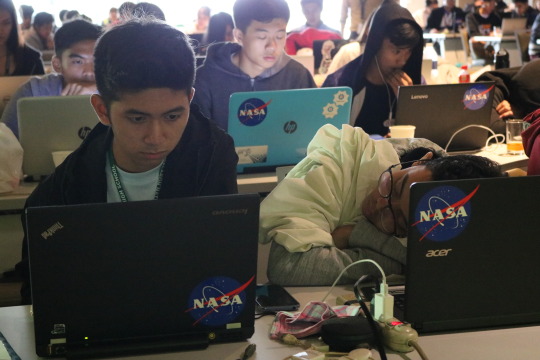
Many Filipinos participated in this annual hackathon since 2016. Recently, a dengue mapping forecasting system was developed by data scientists from CirroLytix using satellite and climate data with the goal of addressing the sustainable development goals of the United Nations. This web application, called Project AEDES won globally for the best use of data. "Earth observation data has the potential to be used in fighting epidemics and outbreaks threatening humanity nowadays, as well as to analyze its socio-economic impact," according to software developer Michael Lance M. Domagas, who led the Philippine hackathon in collaboration with De La Salle University, PLDT, Department of Science and Technology, United Nations Development Programme, and the U.S. embassy. The very first Philippine winner used citizen science and environmental data to develop a smartphone application informing fishermen the right time to catch fish. ISDApp is currently being incubated at Animo Labs.
Space Apps is a NASA-led initiative organized globally in collaboration with Booz Allen Hamilton, Mindgrub and SecondMuse. The next annual Space Apps Challenge is scheduled for October 2-4.
Registration opens May 12. https://covid19.spaceappschallenge.org/
0 notes
Text
NASA, partners launch virtual hackathon to develop COVID-19 solutions
NASA, partners launch virtual hackathon to develop COVID-19 solutions
The U.S. space agency National Aeronautics Space Administration (NASA), European Space Agency (ESA), and Japan Aerospace Exploration Agency (JAXA) are inviting coders, entrepreneurs, scientists, designers, storytellers, makers, builders, artists, and technologists to participate in a virtual hackathon on May 30-31dedicated to putting open data to work in developing solutions to issues related to…
View On WordPress
0 notes
Text
First Pinoy app nominated as global finalist to the NASA Space Apps Challenge
MANILA, Philippines -- Among the 2,729 teams in 200 locations all over the world who participated in the NASA Space Apps Challenge, an app made by Filipino innovators was nominated first time by NASA scientists and experts to become a finalist at the global level. Altogether, they will join the top 25 in competing for the six winners of the biggest hackathon in the universe.
youtube

The winning app seeking to communicate scientific data to fishermen even without Internet connection was made by IT professionals Revbrain G. Martin, Marie Jeddah Legaspi, and Julius Czar Torreda from team iNON, which stands for "It's now or never." Named ISDApp, from the Tagalog word "isda" meaning fish, it sends useful information to fishermen such as real-time weather, sunrise and sunset, wind speed, and cloud coverage to plan their fishing activities in catching more fish using the NASA GLOBE Observer app, a data collection from citizen scientists around the world used in concert with NASA satellite data to identify or communicate information, and educating the public about planet Earth. Fishermen will receive SMS notifications from the Amazon Web Services gateway while local government officials would manage their details using a smartphone app connected to the cloud. NASA scientists and experts consider this fisherfolk app made by Pinoys as one of the solutions "with the most potential to improve life on Earth or in the universe," therefore nominated as global finalist for Galactic Impact.

The fishermen app won in the local level on Friday-Sunday, October 19-21, 2018 at De La Salle University, Malate, Manila, Philippines, in collaboration with the Embassy of the United States of America to the Philippines and PLDT. US Embassy deputy chief of mission John C. Law, PLDT Enterprise Core Business Research and Development head Leandro T. Santos, DOST-Philippine Council for Industry, Energy and Emerging Technology Research and Development deputy executive director Engr. Raul C. Sabularse, Department of Information and Communications Technology senior planning officer Yvette M. Cabrera, and Animo Labs executive director Federico C. Gonzalez served as jurors at the local level.
youtube
An emergency checklist kit app designed for disaster preparedness also won at the local level developed by students Jeorge Loui P. Delfin, Bluen Ginez, Samuel Jose, Rainier G. Narboneta, and Eugenio Emmanuel A. Araullo. Other projects and solutions developed during the hackathon are games using images from the Hubble Space Telescope, augmented reality mobile app to tell a story of the changes in the Arctic and Antarctic ice, artificial intelligence app helping scientists confirm the habitability of exoplanets, and story-based game using NASA Earth imagery. They joined together with teams of coders, scientists, developers, designers, storytellers, makers, builders, technologists, thinkers, entrepreneurs, and everyone around the globe working together in a 48-hour sprint to develop solutions to some of the most pressing challenges on Earth and in space, using NASA resources and data.
A day-long data bootcamp was held to learn new concepts, strategies and skills from keynote speakers, panelists, and mentors. Michael Carroll from Urban Engine in Huntsville, AL and NASA Earth Science Division senior advisor Dr. Patricia Jacobberger introduced Space Apps through a virtual talk while NASA astronaut Drew Feustel, orbiting aboard the International Space Station welcomed everyone to the event. US Embassy science fellow Dr. Anondo Mukherjee and US Fulbright fellow Sarah Marie Hartman gave an online lecture about the Earth's environment. DOST-Advanced Science and Technology Institute acting director Dr. Joel Joseph S. Marciano, Jr. and PHL-Microsat program leader Dr. Marc Caesar R. Talampas discussed microsatellite development and advanced technologies in the Philippines.
Several mentors coming from different backgrounds such as YSEALI alumni Ryan Madrid and Malcolm Flores, De La Salle University professors Jordan Aiko P. Deja and Neil Patrick A. Del Gallego, PHL-Microsat engineers Ariston N. Gonzalez, Lorenzo Sabug, Jr., Benjamin Joseph D. Jiao, and Carlo D. Pastoral, Amazon Web Services developers John Luis Garcia, Dennis Magsajo, and Randy Bardaje, Animo Labs incubatee and MachiBox CEO Simon Gregory Mabanta, VR Philippines lead Cristopher David, Mobility IT 4 Youth lead Art Polo Gabriel III, nuclear physicist Dr. Jasmine Albelda, and entrepreneur Ibba Bernardo guided participants in creating their winning apps and solutions to solve problems on Earth and space. Department of Information and Communications Technology undersecretary Monchito B. Ibrahim gave an inspiring message to the participants. IdeaSpace and Animo Labs looked upon promising projects and solutions that might have a business potential.
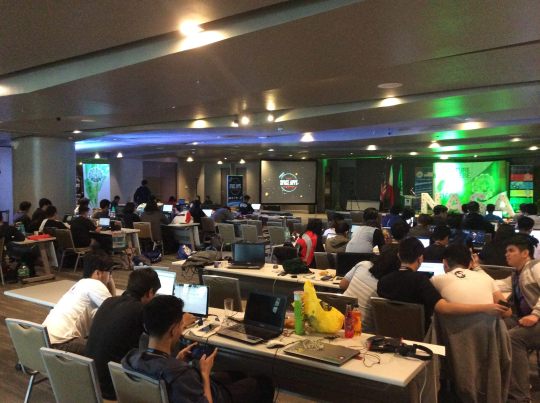
During the hackathon period, teams are expected to find solutions to themed challenges put forth by NASA. They work together with the rest of the world on hackathon weekend to devise creative and innovative solutions to these challenges. Projects do not have to be apps and anyone does not need to become a computer programmer to participate. Participants collaborate to build anything — from open-source software, hardware, data visualizations, and citizen science platforms, to videos, art, and other communications solutions — aimed at addressing global challenges. The overarching theme of the 2018 challenges is "Earth and Space," underscoring the connections between major challenges, and the potential solutions to them, both on Earth and in space. The 2018 mainstage Space Apps event was hosted by Urban Engine in the US Space and Rocket Center at Huntsville, AL, also known as "The Rocket City."
youtube
Since its inception in 2012, the International Space Apps Challenge has become the world’s largest global hackathon, engaging thousands of global citizens to collaborate in building innovative solutions to complex challenges using NASA’s open data. Hackathons are technology development marathons that draw on the talents and initiative of bright-minded people. Space Apps inspires local innovation communities to convene, cooperate, and create.
The 2018 hackathon was organized by Matt T. Keener, Jeanie M. Duwan, Randolf D. Mariano, and Xavier E. Lara from the American Spaces Philippines of the US Embassy and Kai Shan L. Fernandez, Christine M. Abrigo, Donna Lyn G. Labangon, Kevin Anthony Y. Kaw, and Dr. Rafael A. Cabredo from De La Salle University. Another hackathon was organized at Makati-Bonifacio Global City by Womensphere. In the past years, Tzar C. Umang brought Space Apps in Dagupan, Pangasinan on 2016 while Art Polo Gabriel III, Wilson Censon, and Tito Mari Francis Escaño organized one in PLDT InnoLab in Mandaluyong, Metro Manila. De La Salle - College of Saint Benilde also hosted Space Apps on 2017 by Dr. Edward M. Moises, Norman Lee, and Catherine Valdellon-Mojado.
Lead organizer Michael Lance M. Domagas is very thankful that NASA scientists and experts recognized the skills and talents of Filipinos in building projects and open-source solutions that address real-world problems, on Earth and in space, and hoping that Filipinos would win the competition.
0 notes